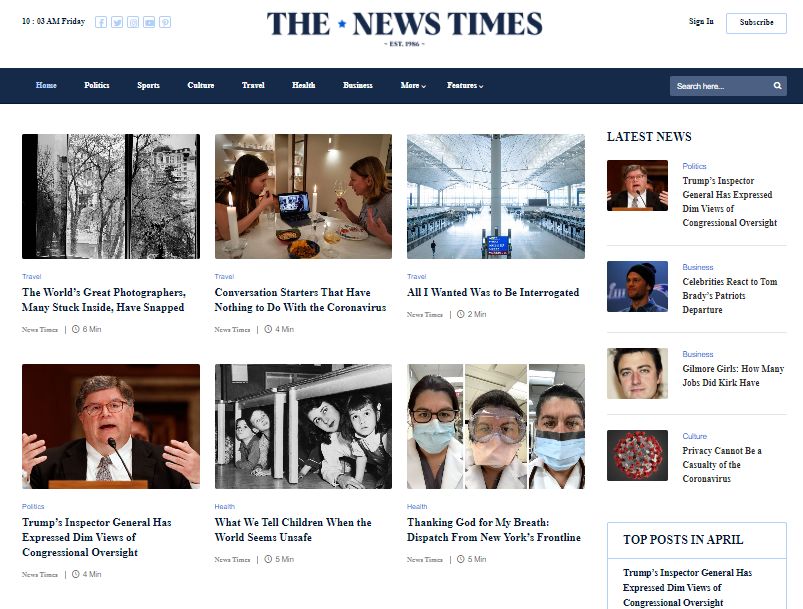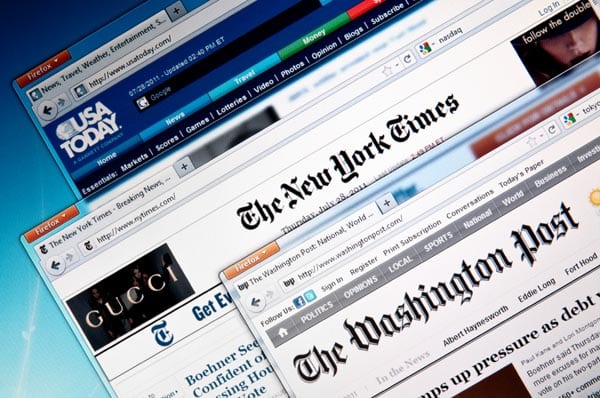Comparing: stnews.live vs Other News Sites Right Now
Wiki Article
The Relevance of Fact-Checking on the planet of News Online
The frequency of misinformation in today's on the internet news landscape has actually gotten to startling levels. Fact-checking organizations play an essential role in combating this trend. They confirm insurance claims and improve the reliability of journalism. The performance of these companies often hinges on their approaches and public assumption. As audiences navigate this complex setting, the effects of their searchings for may shape the future of news consumption and trust. What does this mean for the honesty of details moving on?
The Rise of Misinformation in the Digital Age
How has the advent of electronic technology added to the spread of misinformation? The quick growth of the net and social media sites platforms has actually assisted in the circulation of information at an unprecedented rate. Users can share articles, video clips, and opinions with a simple click, commonly without validating the content's precision. Algorithms focus on mind-blowing or mentally charged product, bring about an expansion of deceptive narratives that record attention.Furthermore, the privacy afforded by digital systems allows individuals to spread incorrect info without accountability (stnews.live). Misinformation prospers in echo chambers, where users are subjected mostly to perspectives that strengthen their ideas, further entrenching falsehoods. The saturation of information can bewilder users, making it challenging to determine qualified resources from unstable ones. Consequently, misinformation has actually come to be a pervasive issue in the digital landscape, influencing popular opinion and count on in reputable news resources
The Function of Fact-Checking Organizations
Fact-checking organizations play an essential role in enhancing the reliability of journalism by verifying claims made in news records. Their efforts are important in combating misinformation, making certain that precise info prevails in the electronic landscape. By holding media electrical outlets accountable, these companies contribute considerably to informed public discussion.Enhancing Reliability in Journalism
While false information multiplies in the digital age, fact-checking organizations play an essential role in enhancing the reliability of journalism. These organizations meticulously confirm cases made in newspaper article, public declarations, and social networks posts, making certain that details shared to the general public is accurate and credible. By offering independent evaluations, they serve as a vital resource for reporters, assisting them preserve high standards of stability. Additionally, their initiatives promote openness in media, promoting public trust fund. As audiences come to be significantly critical, the existence of reputable fact-checking entities can distinguish dependable news resources from those that might spread out frauds. Inevitably, the commitment of fact-checking organizations to support reliability is vital for the wellness of democratic discussion.Combating Misinformation Properly
As misinformation continues to spread out rapidly throughout digital systems, the role of fact-checking organizations comes to be increasingly crucial in the battle for exact information. These companies work as watchdogs, inspecting claims made by somebodies and media outlets to assure liability. By employing rigorous research methods and professional evaluation, they verify realities and clear up deceptive narratives. Their findings are shared with numerous channels, educating the general public and promoting critical thinking. Additionally, partnerships with social media systems boost their reach, allowing for prompt flagging of false info. As electronic proficiency expands, the impact of fact-checking companies is essential in empowering audiences to discern truth from fallacy, eventually adding to a much more educated society.How Misinformation Affects Public Assumption
Misinformation considerably threatens count on media, leading target markets to question the integrity of news resources. As a result, individuals usually gravitate in the direction of electrical outlets that enhance their existing beliefs, contributing to the polarization of viewpoints. This dynamic creates a fragmented details landscape, where shared understanding comes to be progressively tough to accomplish.Count on Media

Count on in media has ended up being increasingly breakable in the digital age, where the fast spread of false info can alter public assumption. As false information multiplies across social networks and online platforms, target markets usually locate it challenging to discern trustworthy resources from unstable ones. This unpredictability promotes uncertainty, leading lots of people to examine the objectives behind news reporting. Depend on in established media outlets has lessened, as consumers increasingly transform to different resources that may do not have extensive content standards. This erosion of trust fund not only influences specific ideas however also threatens the collective capability to involve in informed discussions. Eventually, the honesty of journalism is at stake, highlighting the critical requirement for efficient fact-checking to bring back self-confidence in the media landscape.

Polarization of Viewpoints
The boosting hesitation toward typical media has contributed to an expanding polarization of point of views amongst the public. False information, usually disseminated via social networks and on-line platforms, plays a substantial role fit distinct ideological divides. People often choose details that lines up with their pre-existing ideas, reinforcing their point of views while disregarding opposing point of views. This echo chamber effect heightens departments, causing a fragmented public discourse where consensus comes to be progressively elusive. Furthermore, sensationalized narratives grow in this setting, even more skewing public perception and cultivating mistrust in reliable sources. As polarization rises, the necessity for effective fact-checking becomes critical to link voids and advertise notified discussions, inevitably making certain an extra cohesive culture efficient in steering complex problems.Techniques for Efficient Fact-Checking
Effective fact-checking counts on a methodical strategy that consists of comprehensive research study, verification of sources, and important evaluation of insurance claims. A fundamental technique is cross-referencing info from multiple reputable resources to confirm its precision. Fact-checkers often you can check here use specialized data sources and archives to trace the origin of certain statements, making sure that the reported details straightens with documented evidence.One more vital method entails looking at the context in which insurance claims exist. Misleading info can emerge from out-of-context quotations or discerning information usage. By taking a look at the more comprehensive narrative, fact-checkers can recognize prospective biases or false impressions.
Furthermore, engaging with specialists in relevant fields can offer clarity and insight that enhances the fact-checking process. This partnership can discover nuances that laypeople might overlook - stnews.live. Ultimately, a self-displined strategy incorporating these techniques fosters an extra informed public, improving the reliability of information disseminated in the digital age
The Impact of Social Media on News Consumption
Just how has social networks changed the method individuals consume news? The emergence of systems like Facebook, Twitter, and Instagram has significantly transformed news intake patterns. News is now shared quickly, permitting users to gain access to real-time updates and engage with content via sort, shares, and remarks. This immediacy has actually fostered a preference for bite-sized details, usually at the cost of thorough analysis.Furthermore, social media enables individualized news feeds, where formulas curate web content based on customer choices, creating resemble chambers that might restrict direct exposure to diverse point of views. The duty of typical news electrical outlets has actually decreased as people progressively depend on peer recommendations and trending subjects. The reputation of info is typically jeopardized, as sensationalism can eclipse accurate reporting. In general, social media has improved news usage, stressing speed and customization while testing the requirements of journalistic honesty.
Equipping Target Markets to Identify Reputable Resources

Additionally, taking a look at the authorship and business background of newspaper article can disclose potential prejudices. Cross-referencing details throughout several respectable outlets further boosts the verification procedure. Making use of digital tools, such as internet browser expansions that rate the trustworthiness of sites, can also aid in determining trustworthy details. By proactively engaging with these sources and growing an important state of mind, target markets can much better furnish themselves to discern trustworthy news sources, inevitably promoting a more educated culture among the intricacies these days's media atmosphere.
The Future of Journalism and Fact-Checking
As the media landscape progresses, the future of journalism and fact-checking faces both challenges and possibilities. The rise of digital systems has equalized information circulation, allowing diverse voices to arise. This has likewise led to the spreading of misinformation, necessitating robust fact-checking mechanisms. Reporters will increasingly count on modern technology, including AI devices, to validate facts rapidly and successfully.Collaboration in between news organizations and fact-checking entities is expected to reinforce trustworthiness and openness. Audience interaction will certainly play an important duty, as notified visitors come to be substantial companions in recognizing reliable web content.
The need for responsibility and accuracy is likely to grow, pushing journalists to maintain high criteria in their coverage. Inevitably, the future of journalism may depend upon its ability to adapt to technological advancements while maintaining journalistic integrity, making sure that fact-checking stays a cornerstone of reputable news.
Regularly Asked Questions
Just How Can I Report Misinformation I Run Into Online?
To report misinformation run use this link into online, individuals can utilize platform-specific coverage tools, provide clear evidence, and share the details with fact-checking companies. Engaging with community conversations can likewise assist increase awareness regarding the false information.What Prevail Indicators of Misinformation in News Articles?
Typical indicators of false information in newspaper article consist of marvelous headings, lack of qualified resources, emotional language, irregular facts, and lack of writer qualifications. Readers need to critically assess content for these check signs to discern precision.How Do Fact-Checkers Validate Sources?
Fact-checkers validate sources by cross-referencing information with reliable data sources, speaking with experts, and analyzing the original context of claims. They also assess the dependability of the resources, ensuring accurate and trustworthy information for public usage.What Lawful Actions Can Be Taken Versus Misinformation?
Legal actions versus false information may consist of character assassination lawsuits, cease-and-desist orders, and regulative fines. Targets can seek redress with civil courts, while some territories enforce penalties or sanctions on platforms distributing incorrect information.Are There Apps for Fact-Checking News On-The-Go?
Various apps exist for fact-checking news on-the-go, including Snopes, FactCheck.org, and PolitiFact. These applications assist individuals verify cases rapidly, promoting notified decision-making and cultivating a much more discerning technique to consuming news in real-time.Report this wiki page